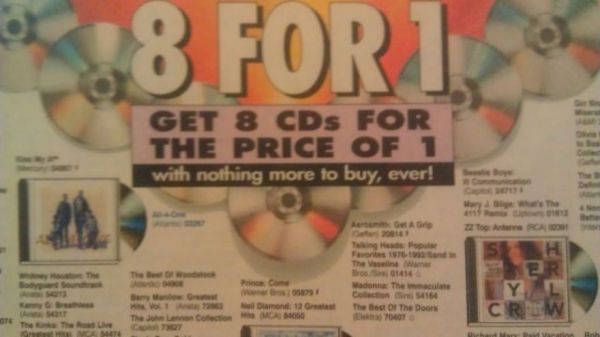Like
many folks, I joined the Columbia Record Club in high school, and
immediately got a dozen of the hottest vinyl LPs for a penny (and many
years later for DVDs). Millions of Americans did, but the real heyday of
the business was in the ‘90s when everyone was buying CDs. The A.V.
Club interviewed eight former employees of Columbia House for an oral
history of the business model of selling music through the club.
SFJ: The negative option—that’s what we called it, right?
CW:
The whole business was premised on this concept called negative option.
Which just sounds so creepy and draconian and weird, but the idea that
if you don’t say no, we’re going to send you shit. It’s going to fill
your mailbox, and we’re going to keep sending it unless you panic and
beat us back. That was how the money was getting generated.
SFJ:
Most times when you’re trying to get somebody to buy something, you are
actively trying to get them to go and buy the thing, even if now it’s
clicking or subscribing and subscription. Columbia House had this
brilliant, perverse method which was [that] you sign up and then all you
have to do is tell us not to send you things, and if you don’t remember
that, we are going to sell you something and you have to pay for. And
enough people will like that? Okay. And it was a profitable business.
Could you ever get anyone to do that again?
PO: You can get a
free trial of software, and if you don’t deal with turning it off,
you’re going to get billed for $49. Again, all these things are
precursors to how business is being done on the internet.
CW: You
guys remember how mind-numbingly complicated the deals were? And they
were always [trying to] squeeze an extra dollar out of everyone. It
would be like, “2 for $3.99 gets you 4 for $4.99 and then a free CD on
top of your $8.99.” You would look at these things, and nobody could
rationally decode these deals. They were so gothic and complicated.
One
thing in the article that stuck with me was that Columbia House was
making so much profit that they could hire people who needed jobs
-musicians between tours and their crews- to do very little work. At the
time, that seemed like an incredible waste of money, but now it looks
like a wonderfully egalitarian idea to reinvest profits in jobs instead
of sending all the outrageous profits to CEOs and stockholders -although
I'm sure those folks did alright. Read a lot more about
the business of selling records through the Columbia Record Club at the A.V. Club. The article also contains the full-length documentary
The Target Shoots First, about the inner workings of Columbia House.


No comments:
Post a Comment